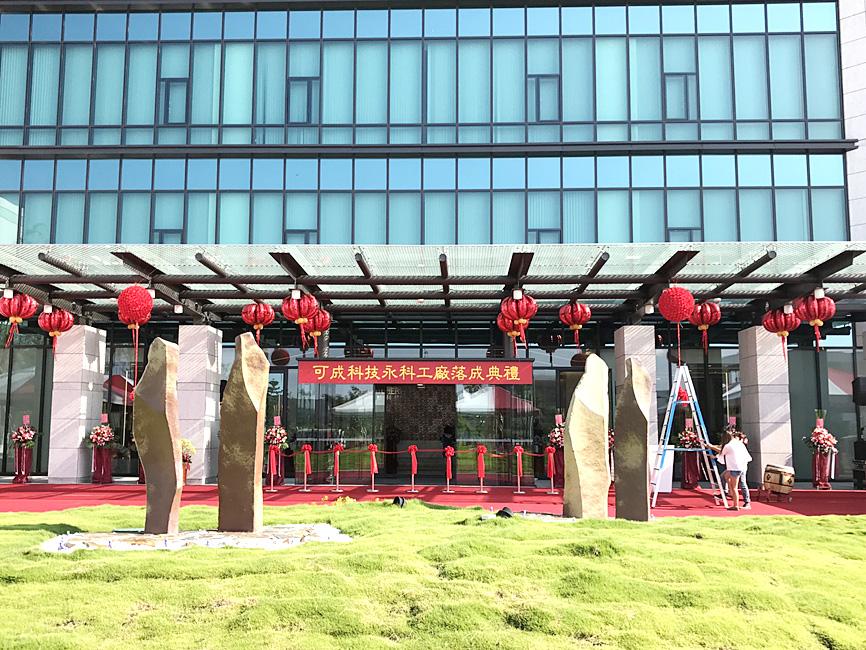Metal casing supplier Catcher Technology Co (可成科技) on Friday announced that it would sell two wholly owned subsidiaries to China’s Suzhou Sin Ruei Sheng Co (蘇州新瑞勝) and Suzhou Sin Ruei Li Co (蘇州新瑞利).
The Tainan-based firm said the sales are part of its strategies for financial planning, long-term operational development and strategic transformation.
Catcher would sell Topo Technology (Suzhou) Co (蘇州可勝科技) and Meeca Technology (Suzhou Industrial Park) Co (蘇州工業園區可利科技) for a total of 1.27 billion yuan (US$199.38 million), a regulatory filing showed.

Photo: Chang Hui-wen, Taipei Times
Catcher said the disposal gains amounted to US$99.95 million, which would result in earnings per share of NT$3.65 based on the 761.62 million common shares in circulation.
The Suzhou plants are idle facilities, the company said.
Asset revitalization would help the company maximize its financial and operational resources, it said.
Catcher manufactures aluminum and magnesium alloy casings for notebook computers, tablets, handsets and other consumer electronic devices.
The divestment comes as Catcher proceeds with its business transformation by branching into non-consumer electronics businesses such as automotive electronics, 5G applications and medical care.
The company last year sold its handset business in China.
Metal casings used in notebook and tablet computers still dominate the company’s product portfolio, but slower orders amid component shortages and logistics constraints led its revenue last month to fall 3.5 percent month-on-month to NT$2.73 billion (US$98.42 million).
On an annual basis, revenue plunged 53.35 percent.
Company data showed that in the first 11 months of this year, cumulative revenue dropped 49.32 percent to NT$38.46 billion from a year earlier.
Catcher shares closed at NT$156 in Taipei on Friday, down 0.64 percent from the previous session.
Amid the decline in revenue and a lack of clear sales drivers in the long term, its stock price has decreased 24.27 percent so far this year, compared with the broader market’s 21 percent rise.
On Thursday, the company started to buy back its own shares on the open market to bolster its share price. It is the firm’s second buyback scheme this year.
The company is planning to repurchase up to 25 million common shares until Feb. 8 at a share price of NT$106.8 to NT$238.5, it said in a regulatory filing on Wednesday.
Catcher would continue the program past that date if the share price falls below the lower limit, it added.

In Italy’s storied gold-making hubs, jewelers are reworking their designs to trim gold content as they race to blunt the effect of record prices and appeal to shoppers watching their budgets. Gold prices hit a record high on Thursday, surging near US$5,600 an ounce, more than double a year ago as geopolitical concerns and jitters over trade pushed investors toward the safe-haven asset. The rally is putting undue pressure on small artisans as they face mounting demands from customers, including international brands, to produce cheaper items, from signature pieces to wedding rings, according to interviews with four independent jewelers in Italy’s main

Macronix International Co (旺宏), the world’s biggest NOR flash memory supplier, yesterday said it would spend NT$22 billion (US$699.1 million) on capacity expansion this year to increase its production of mid-to-low-density memory chips as the world’s major memorychip suppliers are phasing out the market. The company said its planned capital expenditures are about 11 times higher than the NT$1.8 billion it spent on new facilities and equipment last year. A majority of this year’s outlay would be allocated to step up capacity of multi-level cell (MLC) NAND flash memory chips, which are used in embedded multimedia cards (eMMC), a managed

Japanese Prime Minister Sanae Takaichi has talked up the benefits of a weaker yen in a campaign speech, adopting a tone at odds with her finance ministry, which has refused to rule out any options to counter excessive foreign exchange volatility. Takaichi later softened her stance, saying she did not have a preference for the yen’s direction. “People say the weak yen is bad right now, but for export industries, it’s a major opportunity,” Takaichi said on Saturday at a rally for Liberal Democratic Party candidate Daishiro Yamagiwa in Kanagawa Prefecture ahead of a snap election on Sunday. “Whether it’s selling food or

In the wake of strong global demand for AI applications, Taiwan’s export-oriented economy accelerated with the composite index of economic indicators flashing the first “red” light in December for one year, indicating the economy is in booming mode, the National Development Council (NDC) said yesterday. Moreover, the index of leading indicators, which gauges the potential state of the economy over the next six months, also moved higher in December amid growing optimism over the outlook, the NDC said. In December, the index of economic indicators rose one point from a month earlier to 38, at the lower end of the “red” light.